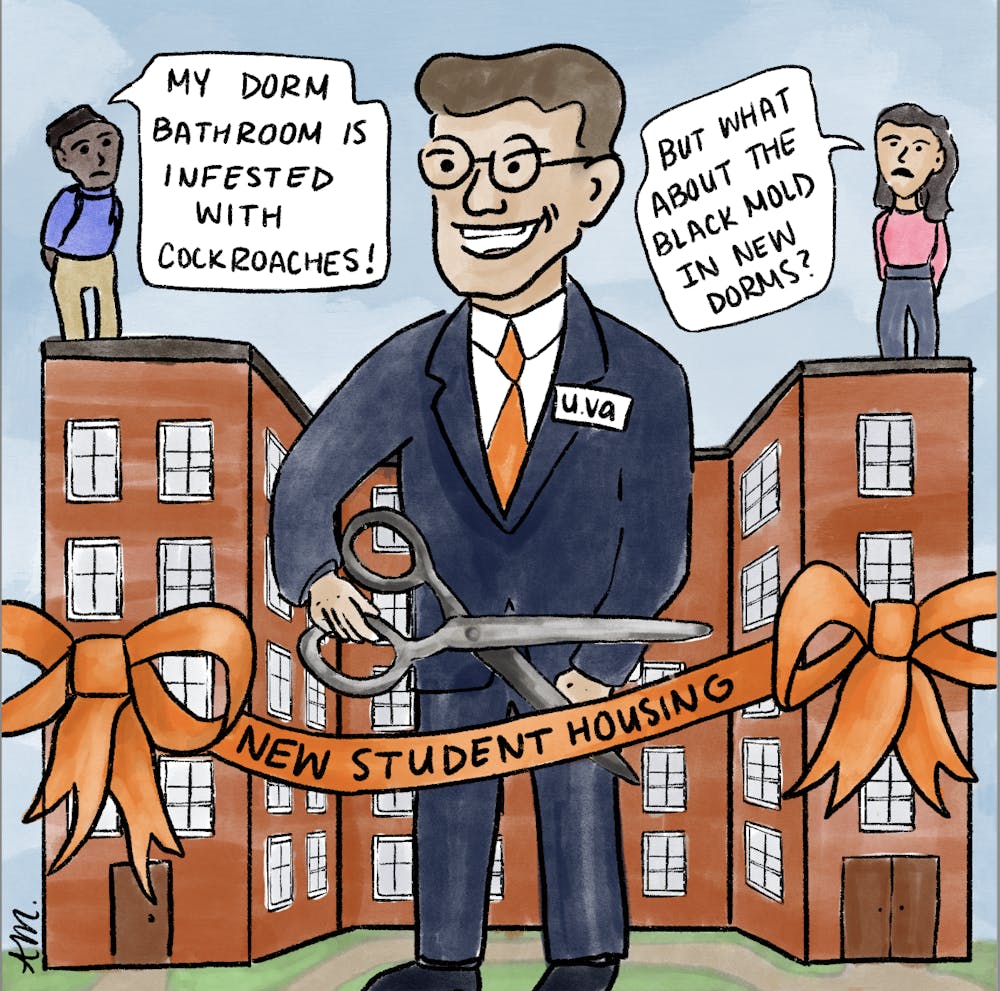There are reports that upperclassmen residences are having a mold problem. This is not the first time that this problem has arisen, and it will likely not be the last. Nevertheless, it is unacceptable and poses a genuine health risk to affected students. What is particularly shocking about this recurrence, though, is not the mold itself. Rather, what is shocking is that mold is just the tip of the iceberg. Despite the presence of subpar living conditions for some students on Grounds, the University has recently made a series of decisions that implicitly deprioritize the maintenance of spaces which contribute to student well-being, in favor of flashy new spaces that paper over existing cracks. In order to truly promote the overall health of its students, the University must place a priority on the maintenance of spaces that already exist.
The issue of maintenance is not isolated to mold in residences — but can be seen in many facets of student life and in many spaces. Consider the inaccessibility of Grounds’ physical landscape. Many buildings and walkways on Grounds are the antithesis of physically accessible, something which represents a barrier to student well-being. The Academical Village, John W. Warner Hall and many of the first-year dorms are constructed with able-bodied people in mind. While renovating these spaces might not be glamorous and might require innovative approaches to enhancing existing spaces, the degree of inaccessibility is deeply unacceptable. True accessibility does not solely mean ensuring that new construction meets accessibility standards, but also retrofitting and renovating existing buildings to meet those same expectations.
Additionally, some older buildings have fallen behind, not just in accessibility, but also in cleanliness and in ensuring student health. Mold is one example of this. Brown College residents will likely also remember the sewage flood in 2023. And Bice House residents will likely remember the flood at the end of last spring which covered the ground floor in half a foot of water. And let’s not even open the can of worms — perhaps literally — that is the Woody-Cauthen dormitories. In short, the current mold problem in Bice House is emblematic of a broader trend of problematic living conditions which suggest that the University is focusing on the new, at the direct expense of the old.
Perhaps this lack of investment could rhetorically be justified by using expansion for the explicit purpose of creating new spaces which directly improve student well-being. And to some degree, this has been prioritized in spaces like the Contemplative Commons. However, generally speaking, even the University’s expansion of buildings foregrounds projects which do not contribute, and many actually detract, from student health and well-being.
Consider the new dining locations in Gaston House and Ramazani House. Instead of constructing a complete grocery store in this space — something experts argue would greatly help reduce food insecurity and food inaccessibility on Grounds — the University filled this space with unhealthy and overpriced food options. This sort of expansion sets a risky precedent for further University development — it is expansion which is framed as beneficial for student well-being but actually undermines this very concept. As the demand for on-Grounds dining options increases, it is crucial that the University commits to making healthy food accessible and affordable — rather than simply flashy and convenient.
Perhaps it is easier for the school to find funding for new buildings, rather than for maintenance and renovation of older ones, and its expansion goals may well be rooted in a desire to improve the student experience on Grounds. Nevertheless, they can not, and should not, do so at the expense of what is here now. The University has articulated a vision for the future which is largely compelling in its focus upon both the student body and the Charlottesville community. However, this plan implicitly demands an extensive expansion of the University and its physical spaces. To be clear, the expansion in and of itself is not the issue — although, it does raise a few concerns. Rather, the issue is that it seems as though the University cannot walk and chew gum at the same time.
While some of the decisions prompted by the 2030 plan, which aims to make the University the best public university in five years, can be construed as contributing to student well-being long term, it is imperative that the plan does not come at the expense of current student health. This is not to say that the University has completely ignored student well-being. It has taken commendable steps in improving energy efficiency in buildings across Grounds and in widening sidewalks on McCormick Road to improve pedestrian safety and reduce vehicle traffic. These successes, however, do not detract from the severity of issues like mold, physical inaccessibility and poor food quality. Problems such as these represent legitimate obstacles to current student well-being and must be treated as such. The University cannot let its focus on the future obscure its present responsibilities.
The Cavalier Daily Editorial Board is composed of the Executive Editor, the Editor-in-Chief, the two Opinion Editors, their two Senior Associates and an opinion columnist. The board can be reached at eb@cavalierdaily.com.







